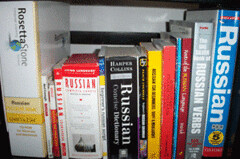Frequency word lists, are they helpful?
I spied a book on Amazon today, Russian Learner's Dictionary: 10,000 Words in Frequency Order. In fact, Amazon is recommending it to me (surprise!). And it does, indeed, look like a great book for me.
Do frequency word lists really help beginning learners? I definitely need some help on acquiring new Russian vocabulary, but I have been working under the assumption that it is best to learn vocabulary in context.
From John Dingley in the Canadian Modern Language Review:
There is much in RLD which is to be applauded and which, I am certain, will ensure that the work is widely used. This is not just a list of words. It contains much useful and necessary grammatical information, such as noun stress patterns. There is good cross-referencing, especially with respect to verbal aspectual pairs. The English glosses are succinct but adequate. Contextual examples are given for the first 600 words, which is helpful; I would have liked to see this exemplification for all entries. At the end of the book (pp. 309-429) there is an index giving the words in alphabetical order, which, again, is a most useful feature of the book.Perhaps frequency word lists are helpful when learning a language with the assistance of a teacher. Would a vocabulary list be helpful to me as I learn on my own?
Recently my lack of vocabulary was made very evident to me. A colleague, who had learned of my Russian hobby, came by my office to ask me to translate an airplane flight manual that he had acquired (along with the airplane). I, of course, knew NONE of the words in the manual except "Section 1." My colleague seemed disappointed in my lack of Russian language abilities. He even seemed downright downtrodden. I spent some time looking up words in the dictionary in order to decipher the text, but this was not what he had intended by asking for my assistance.
Help!
tag(s): Russian




No comments:
Post a Comment